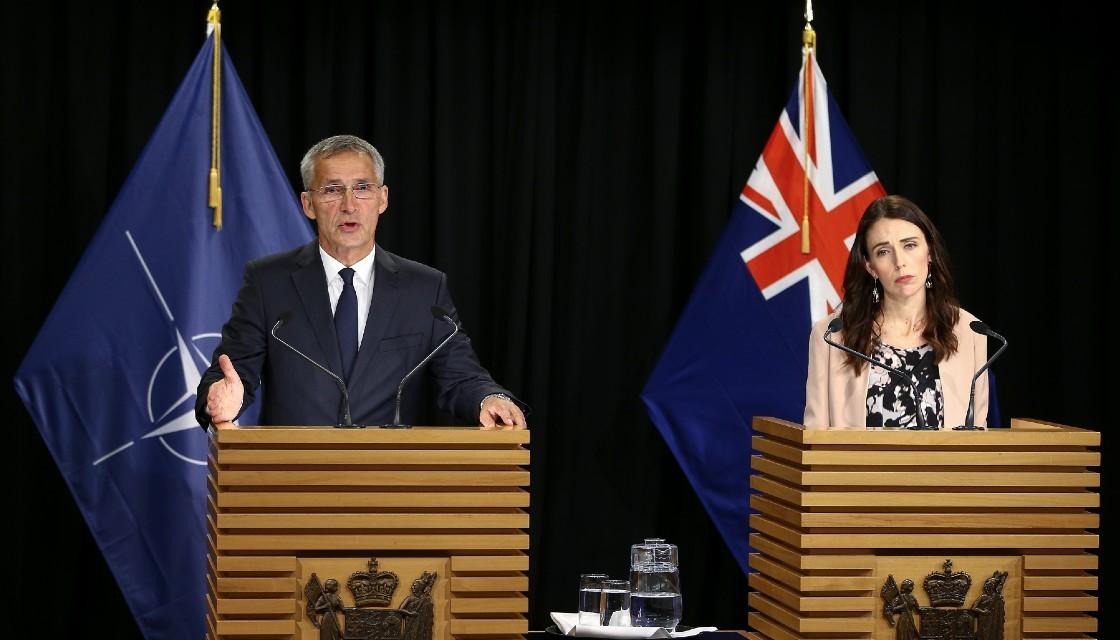The NATO military alliance of 30 countries across Europe and North America has agreed to "step up" and help New Zealand and Australia combat "China's growing influence".
In a speech following high-level meetings among NATO Foreign Ministers on Thursday, NATO Secretary-General Jens Stoltenberg said the alliance had "agreed to step up cooperation with our partners in the Asia-Pacific".
The North Atlantic Treaty Organisation (NATO) between the United States, Canada and 28 European countries was established in the aftermath of World War II. Each signatory is required to come to the defence of other members in the event of an attack.
Ukraine is not a member of NATO, meaning there was no legal obligation for NATO countries to defend it after Russia invaded in February. Russia has long sought assurances that its former Soviet neighbour would not join the military alliance.
While New New Zealand is not a member of NATO, it is one of a few countries referred to as "partners across the globe" that contribute to NATO-led defence operations.
Stoltenberg stood alongside Prime Minister Jacinda Ardern in 2019 at the Beehive and praised New Zealand's contributions in the fight against terrorism, including its role in NATO's training mission in Afghanistan.
Last month New Zealand donated $5 million to NATO to support Ukraine with non-lethal military aid. It would be primarily directed to the NATO Trust Fund which provides fuel, military rations, communications and military first aid kits.
Foreign Affairs Minister Nanaia Mahuta attended the latest NATO meeting virtually.
The outcome was significant for New Zealand and the Pacific at large, because NATO has agreed to help counter the growing influence of China - New Zealand's largest trading partner - in the region.
"We have seen that China is unwilling to condemn Russia's aggression. And Beijing has joined Moscow in questioning the right of nations to choose their own path," Stoltenberg said.
"This is a serious challenge to us all. And it makes it even more important that we stand together to protect our values."
China and Russia have grown closer in recent months, evident by a joint statement in February by Russian President Vladimir Putin and his Chinese counterpart Xi Jinping, saying that there were no forbidden areas of cooperation between them.
Stoltenberg said NATO will provide its Asia-Pacific partners - Australia, Japan, New Zealand and South Korea - with "practical and political cooperation" in the areas of cyber, new technology, and countering disinformation.
"We will also work more closely together in other areas such as maritime security, climate change, and resilience."
Ardern earlier this week acknowledged that the global security situation had "changed considerably" in the wake of Russia's invasion of Ukraine.
"These events demonstrate the changing strategic environment that New Zealand is operating in," Ardern said in Parliament on Tuesday.
Russia on Thursday banned Ardern, along with all MPs, spy chiefs and Defence Force leaders from entering Russia in retaliation for sanctions. The same applied to Australian Prime Minister Scott Morrison and 228 other influential Australians.
But closer to home, tension is building in the Pacific after the Solomon Islands negotiated a security deal with China, which both Ardern and Morrison described as concerning.
Solomon Islands Prime Minister Manasseh Sogavare responded by rebuking New Zealand and Australia for their disapproval of his country's security agreement with Beijing.
"We find it very insulting to be branded as unfit to manage our sovereign affairs, or have other motives than pursuing our national interests," Sogavare said in a speech to the Solomon Islands Parliament.

Chinese Foreign Ministry spokesperson Wang Wenbin urged New Zealand and Australia to respect the sovereignty of the Solomon Islands.
"Relevant countries should earnestly respect Solomon Islands' sovereignty and its independent decisions instead of deciding what others should and should not do self-importantly and condescendingly from a privileged position."
Ardern said she was willing to talk it out with Sogavare.
"All that we are asking is that the Solomons give consideration to a Pacific response to these issues and engage with the Pacific, particularly through the Pacific Island Forum," she said on Tuesday.
"I have no hesitation engaging directly. I know he has also received similar conversations from other Pacific Island leaders."
The Government announced last week it would extend the deployment of up to five Defence Force personnel in the Solomon Islands, to be reviewed on May 31.
It followed the deployment of 65 Defence Force personnel in December after a request for help from the Solomon Islands, following riots sparked by its decision to recognise China over Taiwan.
The Government also dispatched nine Defence Force analysts to Britain and Belgium to assist with the response to Russia's invasion of Ukraine. The Defence Force will help European partners by gathering intelligence about the war during their nighttime hours.



